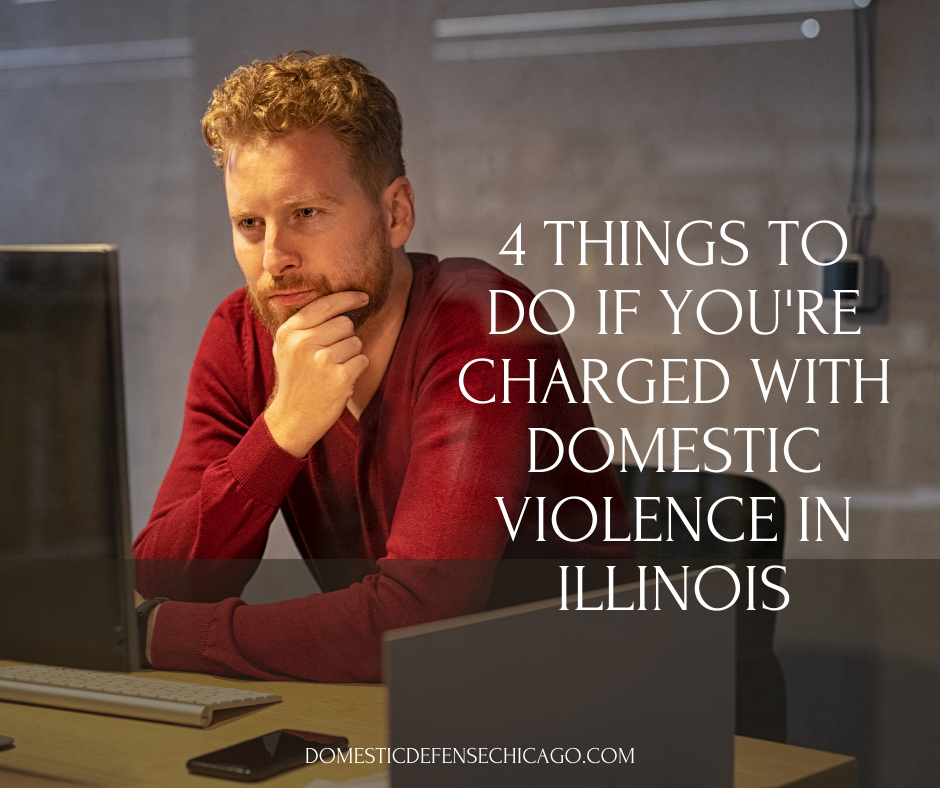If you’re like many people, you’re facing a domestic violence charge (technically, the charges are domestic battery or aggravated domestic battery) and you’re not sure what to do next. It doesn’t matter whether you made a mistake or the other party exaggerated or outright lied – you’re stuck with a criminal charge that you’re going to have to appear in court over.
So what do you do next?
Here’s what you need to know.
4 Things to Do if You’re Charged With Domestic Violence in Illinois
If the police have charged you with domestic violence, here are the four things you need to do:
- Familiarize yourself with the possible penalties of a conviction
- Stay away – far away – from the person who accused you
- Call an attorney for legal advice
- Follow your attorney’s instructions
Here’s a closer look at each.
#1. Familiarize yourself with the possible penalties of a conviction
The state of Illinois takes domestic battery offenses very seriously – and that means the penalties of a conviction can be extremely harsh. If you’re convicted of domestic battery or aggravated domestic battery, you’re looking at jail or prison time plus fines.
First offense domestic battery is usually a Class A misdemeanor, but if you have a prior conviction or if you have met one of the circumstances listed in the Illinois Domestic Violence Act, it can be a Class 4 felony. Aggravated domestic battery is a Class 2 felony, which carries a penalty of up to 7 years in prison. (And if you have a prior aggravated domestic battery conviction, you could spend up to 14 years in prison.)
Related: What happens with a second domestic battery charge?
#2. Stay away – far away – from the person who accused you
No matter what you do, stay away from the person who accused you of domestic battery. That may mean staying at a friend’s house, going to a hotel, or missing out on time with your children. It’s not fair, but to protect yourself from any unintended consequences, that’s the way it has to be. Don’t answer phone calls, don’t send emails, and definitely don’t go to the person’s house (even if it’s your house, too).
#3. Call an attorney for legal advice
Because domestic battery penalties can be extremely harsh – you could spend up to 14 years in prison if you’re convicted under some circumstances – it’s important that you use your right to an attorney. You should get in touch with a lawyer who’s familiar with domestic battery cases in Illinois so you can get the advice you need.
Related: The basics on domestic battery in Illinois
#4. Follow your attorney’s instructions
Your Chicago domestic battery defense lawyer’s job is to get you the best possible outcome, but he can’t do that if you don’t listen to his advice. After your attorney has told you what you should do, as well as what he’s going to do in order to get you the best possible outcome, sit back and let him handle your case.
Do You Need to Talk to a Lawyer About What to Do if You’re Charged With Domestic Violence in Illinois?
If the police have charged you with domestic violence in Illinois, we may be able to help you. Call us right now at 847-920-4540 for a free consultation with an experienced, knowledgeable and understanding lawyer now. If it’s easier, fill out the form below and we’ll get back to you as soon as we can.







Leave A Comment
You must be logged in to post a comment.